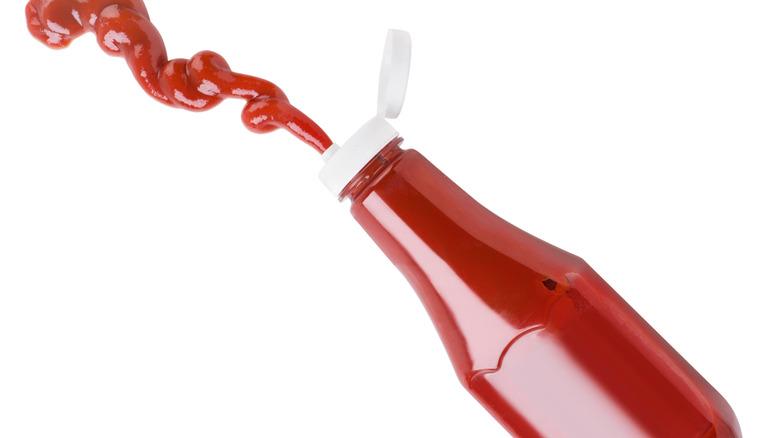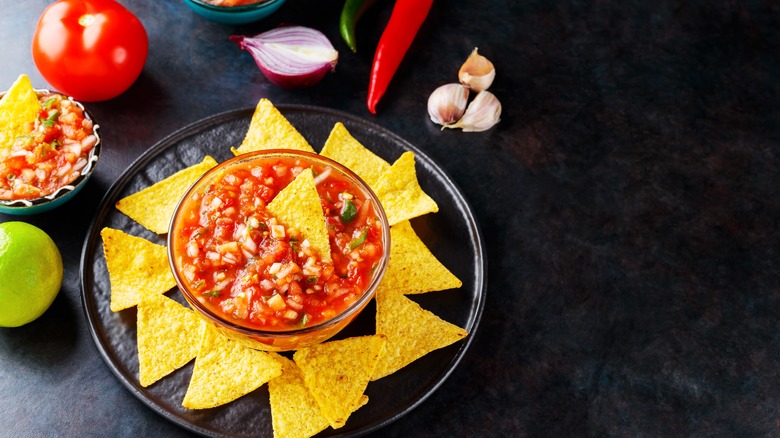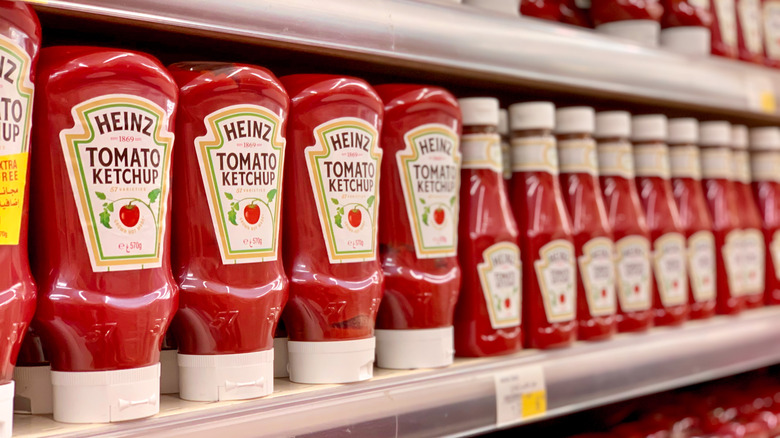The Jarred Condiment That Outsold Ketchup In The Early '90s
Getting some McDonald's fries for a quick snack? Are you finding your hamburger kind of dry? Better ask for some ketchup to go with them. What condiment do you usually see paired next to a big plastic tube of mustard? Why, it's ketchup, that classic fast food companion, which has made itself at home in both the pantries of thousands of Americas and in the pages of history books.
From the publishing of the first known tomato-based ketchup recipe in 1812 (via National Geographic) to Henry J. Heinz manufacturing Heinz ketchup in 1876 (via Thrillist) to the advent of modern fast food, this tangy, sweet blend of tomatoes, spices, and sugars remains a key condiment in ballparks, diners, and home refrigerators. We aren't exaggerating when we say people go crazy over this stuff, with 308.39 million Americans having enjoyed ketchup in 2020 alone (via Statista). A report from Buzzfeed that same year (per Audacy) reveals that 14% of people would be willing to eat ketchup by the spoonful. Needless to say, some folks just really like ketchup, be it glazed on meatloaf or paired alongside French fries.
But there was a time when ketchup, if at least for a brief time, wasn't the condiment Americans were reaching for. In the 1990s, Americans were looking for a spicier, chunkier type of condiment that would jolt them with the spice and heat that ketchup just couldn't give.
Salsa was more popular than ketchup in the 1990s
HISTORY describes the 1990s as being characterized by relative "peace and prosperity," further influenced by the introduction of the mainstream World Wide Web. Maybe it was generally decided that in this bold new era, Americans needed a bold condiment, something that would offer more flavor and "heat" to their meals. Salsa, it would seem, was the answer.
Forbes explains that, during the 1990s, the United States saw an "increase in the Latino population." These citizens preferred a more familiar condiment, leading to a renewed focus on salsa rather than the American staple of ketchup. This wasn't simply just a simple change of pace, either — The New York Times, The Atlantic says, reported that salsa was outselling ketchup by an astounding $40 million in grocery stores. Indeed, Americans had begun to find salsa as a much more thrilling condiment than the same old ketchup their grandparents enjoyed.
As a 1999 article from the Associated Press (via Deseret News) tells us, the kings of ketchup weren't going to go down without a fight. Heinz Ketchup, for example, promised that it would begin a campaign to "rebuild" its image, using ads in pop culture like MTV, as well as "redesigning" the ketchup formula to eliminate that watery tomato solution found at the top of a ketchup bottle. But could it be that salsa, once rooted in American culture, would remain a powerful player in the condiment game?
Salsa and ketchup continue to go neck-and-neck
Because we're well out of the fanny packs and grungy fads of the 1990s, you might think people settled down and went back to the comforts of traditional ketchup. While it is true that salsa obviously didn't smudge ketchup out of the picture, the two condiments are still trying to outsell the other.
Fox News reports that in 2016, salsa and other foods once considered "ethnic" like tortillas had once again begun to outdo more "American" foods. This was debated to be for a variety of reasons, ranging from large numbers of Latino immigrants to the United States, a change in what Americans considered "ethnic" and "American," or even simply because such foods are seen as "healthier." Comedian Jerry Seinfeld (whose show, ironically enough, had the argument of salsa versus ketchup being discussed by the character George Costanza) actually commented on this matter on Reddit (via Yahoo! Life).
"I don't know why. And I've had some good salsa," was Seinfeld's comment. "People probably like it because they can see the tomatoes in it? Whereas with ketchup, you have no idea where this came from."
While neither Jerry Seinfeld nor George Costanza (nor the actor who played him, Jason Alexander) can truly answer the question as to why salsa is taking over the condiment shelves of American grocery stories, it's clear ketchup and salsa have both remained American favorites for many years. At least mustard fans out there don't have anything to worry about.


